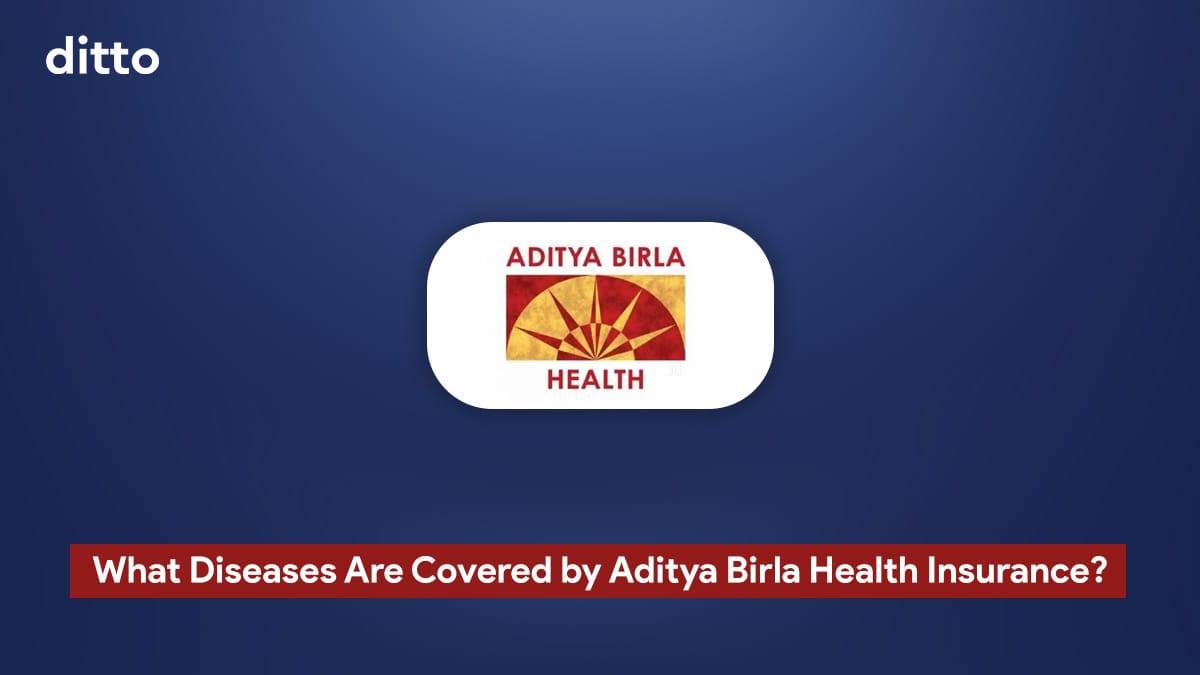What Diseases Are Covered by Aditya Birla Health Insurance?
Aditya Birla Health Insurance does not follow a fixed list of covered diseases for its regular health plans. Instead, it provides protection for all medically necessary treatments, except for conditions explicitly mentioned as exclusions in the policy documents. When choosing a plan, it’s important to pay attention to waiting periods for specific illnesses, pre-existing conditions, and permanent exclusions as per IRDAI guidelines.
For those opting for benefit-based Critical Illness plans, Aditya Birla Health Insurance specifies coverage for serious health conditions such as cancer, heart attack, stroke, and other major illnesses.
Curious about what your Aditya Birla Health Insurance plan actually protects you against? Unlike some policies, there isn’t a fixed list of diseases. Instead, coverage depends on the policy details.
For example, if you have a pre-existing condition like diabetes, your plan might cover related hospitalizations after a 3-year waiting period. However, if the condition is severe or comes with other complications, the insurer may apply a premium increase (loading) or permanently exclude coverage for that condition during underwriting.
By understanding these details, you can get a clear picture of what your plan truly offers and make the most of your health insurance.
Confused about which Aditya Birla plan is right for you? Book a free call with Ditto’s advisors, and we’ll help you compare coverage, exclusions, and benefits before you buy.
What are the Types of Plans Offered by Aditya Birla Health Insurance?
For more details and full plan features, see: Aditya Birla Health Insurance Plan Details.
Which Diseases Are Covered by Aditya Birla Health Insurance?
To reiterate, when it comes to standard indemnity plans, it’s more useful to focus on two key aspects: Exclusions and Waiting Periods, rather than searching for a fixed Aditya Birla Health Insurance covered diseases list.
1. General Coverage & Exclusions
Aditya Birla Health Insurance’s indemnity plans generally cover almost all medically necessary treatments on advice from a medical practitioner, except for a few standard exclusions. These exclusions are common across most health insurance policies and include:
- Permanent exclusions: Diseases, medical conditions, treatments, or procedures never covered under any circumstances.
- Cosmetic and plastic surgeries (e.g., Botox, liposuction) are not medically necessary due to accidents or burns.
- Treatments related to fertility, pregnancy, and childbirth (IVF, surrogacy, and elective abortions), unless the plan offers specific add-ons.
- Self-inflicted injuries, attempted suicide, substance abuse-related injuries, and injuries from illegal activities.
- External congenital anomalies like cleft palate present from birth.
- Mental health treatments beyond hospitalization or therapies lack proven efficacy.
- Diagnostic tests or procedures not part of treatment (e.g., registration fees, service charges).
- Injuries from professional hazardous or adventure sports.
- Treatments arising from war, terrorism, nuclear radiation, or civil unrest.
- Gender reassignment or sex change procedures.
- Treatments from non-recognized healthcare providers.
- External medical aids like hearing aids, spectacles, or prostheses, unless specified.
- Treatments for obesity or weight control are not medically necessary.
- Sexually transmitted diseases, except HIV/AIDS.
- Treatments in non-medical establishments like spas, hydros, or nature cure clinics.
- Costs of dietary supplements or vitamins, unless prescribed during hospitalization.
- Treatments for sleep disorders or certain chronic illnesses may be excluded or permanently excluded based on policy specifics.
- Treatments outside India are generally not covered unless under specialized travel insurance.
- Severe pre-existing conditions (e.g., cancer, rheumatoid arthritis) may be permanently excluded after risk assessment.
Always review the policy wording to understand the permanent exclusions for your specific plan.
2. Waiting Periods
3. Critical Illness (CI) Plan Coverage
For coverage against life-threatening conditions, Aditya Birla Health Insurance offers Critical Illness (CI) plans, which are benefit-based and pay a lump sum upon diagnosis of a defined severe illness.
CI plans are not a replacement for standard indemnity plans. Always refer to the specific policy wording for the exact list of covered diseases, waiting periods, and survival periods.
The IRDAI Standard List of 22 Critical Illnesses
Insurance companies offering CI coverage follow IRDAI guidelines, which include a minimum set of 22 critical illnesses. We’ve split them into categories so it’s easy to narrow down the illness you’d like to be covered for:
Category 1: Heart & Circulatory System
- Myocardial Infarction (First Heart Attack of Specified Severity)
- Open Chest Coronary Artery Bypass Graft (CABG) Surgery
- Open Heart Replacement or Repair of Heart Valves
- Cardiomyopathy
- Aorta Graft Surgery
Category 2: Brain & Nervous System
- Stroke Resulting in Permanent Symptoms
- Coma of Specified Severity
- Motor Neurone Disease with Permanent Symptoms
- Multiple Sclerosis with Persisting Symptoms
- Alzheimer’s Disease
- Benign Brain Tumour
- Brain Surgery
- Major Head Trauma
Category 3: Organ Failure & Transplant
- Kidney Failure requiring Regular Dialysis
- Major Organ/Bone Marrow Transplant
- End Stage Liver Failure
- End Stage Lung Disease
- Primary Pulmonary Hypertension
Category 4: Other Major Conditions
- Cancer of Specified Severity
- Permanent Paralysis of Limbs
- Major Burns (Third Degree Burns)
- Blindness (Total Blindness)
Disclaimer: Based on the standardized list of 22 critical illnesses recognized under IRDAI’s standardization for health insurance products. Specific illnesses covered by plans actually vary between insurers.
Why Talk to Ditto for Health Insurance?
At Ditto, we’ve assisted over 8,00,000 customers with choosing the right insurance policy. Why customers like Arun below love us:

✅No-Spam & No Salesmen
✅Rated 4.9/5 on Google Reviews by 15,000+ happy customers
✅Backed by Zerodha
✅Dedicated Claim Support Team
✅100% Free Consultation
You can book a FREE consultation here. Slots are running out, so make sure you book a call now.
Diseases Covered by Aditya Birla Health Insurance: Ditto’s Take
Understanding the Aditya Birla Health Insurance covered diseases list is less about finding a fixed list of ailments and more about knowing your policy’s exclusions, waiting periods, and coverage limits.
For comprehensive protection, combining a standard indemnity health plan with a Critical Illness policy provides the best safeguard against both routine medical expenses and life-threatening conditions. Always read your policy documents carefully to be fully aware of what is covered under your specific plan.
The absence of a simple, predefined list of covered diseases shouldn’t be a concern. The coverage is broader than any list could fully capture, offering protection for almost all medically necessary treatments.
If you're still weighing your health insurance options, Ditto’s experts are just a call away. We’ll help you cut through the confusion and find a plan that truly fits your life. Book a free call now for personalized guidance.
Frequently Asked Questions (FAQs)
Does Aditya Birla Health Insurance offer Critical Illness cover?
Yes. The Activ Secure: Critical Illness Plan pays a lump-sum benefit on diagnosis of any listed critical illness, such as cancer, stroke, or kidney failure.
What is the waiting period for pre-existing diseases?
It ranges from 1 to 3 years, depending on your plan. You can opt for riders to reduce this duration.
Does Aditya Birla Health Insurance cover COVID-19?
Yes, hospitalization expenses due to COVID-19 are covered under all active policies, as long as they meet medical necessity conditions.
Are maternity benefits included?
Yes, in select plans like Activ Fit Preferred, but only after a 3 year waiting period.
Why isn’t there a fixed “disease list”?
Because coverage is treatment-based, not disease-based. The only limitations are the policy’s exclusions and waiting periods.
Last updated on:










